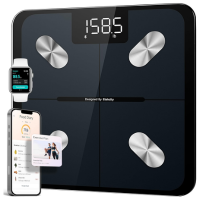
Many people begin their fitness journey with a simple goal: to lose weight or build muscle. But somewhere along the way, motivation can start to fade when progress doesn’t seem obvious. The truth is, our bodies change in ways that aren’t always reflected on a traditional bathroom scale. Weight alone doesn’t tell the full story of what’s happening inside your body. To truly understand your progress and stay motivated, it helps to track more than just a single number.
This is where modern body measurement tools come into play. By paying attention to body composition, trends, and small shifts in weight, you can make better decisions about your workouts, nutrition, and lifestyle.
Why Body Composition Matters
When we talk about “getting healthier,” we often focus on losing pounds. But two people can weigh the same and look completely different depending on muscle mass, body fat percentage, water retention, and metabolism. Body composition gives a clearer picture of your overall health.
Key Body Metrics That Matter
- Body Fat Percentage: Shows how much of your weight comes from fat compared to everything else.
- Muscle Mass: Indicates the amount of muscle in your body, which influences strength and metabolism.
- BMI (Body Mass Index): Offers a quick health-range assessment, though it doesn’t account for muscle.
- Bone Mass: Helps monitor bone health, especially as we age.
- Water Percentage: Affects energy, skin health, and digestion.
Understanding these numbers helps you see progress more accurately. For example, if you’re strength training, your weight might stay the same while your body fat decreases and your muscle mass increases. That’s a win.
The Power of Tracking Your Trends
Small daily changes can be hard to notice, but tracking your metrics consistently helps reveal progress over time. Watching your numbers move in the right direction can be incredibly motivating.
Benefits of Tracking Regularly
- Improved accountability: When you see your data, you’re more likely to stick to healthy habits.
- Goal clarity: Numbers make it easier to adjust your routine to fit your goals.
- Motivation boost: Seeing progress—even slow progress—keeps you going.
It’s not about obsessing over every fluctuation. It’s about observing patterns. Some days you might weigh more simply because you ate salty food or didn’t sleep well. Tracking helps you see beyond the noise.
Making Health Tracking Part of Your Routine
One of the biggest challenges in any fitness journey is consistency. The easier a tool is to use, the more likely it becomes part of daily life.
Tips to Build a Consistent Tracking Habit
- Weigh yourself at the same time each day, preferably in the morning.
- Don’t stress about temporary fluctuations—they’re normal.
- Use trends, not daily numbers, to evaluate progress.
- Pair tracking with other healthy routines, such as stretching, hydration, or journaling.
- Include household members—support makes routines easier to maintain.
When tracking becomes automatic, it becomes a powerful source of insight.
Technology That Helps You Understand Your Health
Fitness and wellness technology now offers ways to see more than just weight. Some tools sync with health apps, allow multiple profiles, and offer additional modes for unique situations like monitoring baby growth or tracking lighter household items.
What Makes Modern Tracking Tools Helpful
- Connectivity: Sync data with commonly used health apps.
- Personalization: Track progress over time with visual charts.
- Ease of Use: Step on and get your info instantly.
- Family-Friendly: Let multiple users track their own numbers.
These features make it easier to stay engaged and make data-driven decisions.
Building Better Habits with Data
Once you have access to your body composition data, the real work begins: using it. Start by setting realistic health goals and making small adjustments.
Examples of Data-Driven Adjustments
- If body fat is high, include more strength training and increase protein intake.
- If muscle mass is low, focus on progressive resistance exercises.
- If water percentage is low, increase hydration throughout the day.
- If weight fluctuates a lot, pay attention to sleep, stress, and sodium intake.
Data helps you stop guessing and start acting.
Fitness Is Personal, Not Perfect
Progress isn’t a straight line. There will be days when you feel strong and days when you don’t. What matters is staying committed to long-term goals.
Remember:
- Everyone’s journey is different.
- Progress comes in many forms.
- Consistency is more important than speed.
You don’t need perfection—you just need momentum.
Conclusion
Tracking your health goes beyond a single number on the scale. By paying attention to body composition, trends, and daily habits, you gain a clearer understanding of your progress and needs. When you combine smart tracking with consistent action, you empower yourself to build a healthier and more confident lifestyle.
The journey is yours. The data is there to guide you. Let progress motivate you, and let small steps become lasting change.
Stay curious about your body. Stay patient with your progress. And most importantly, stay committed to taking care of yourself.

